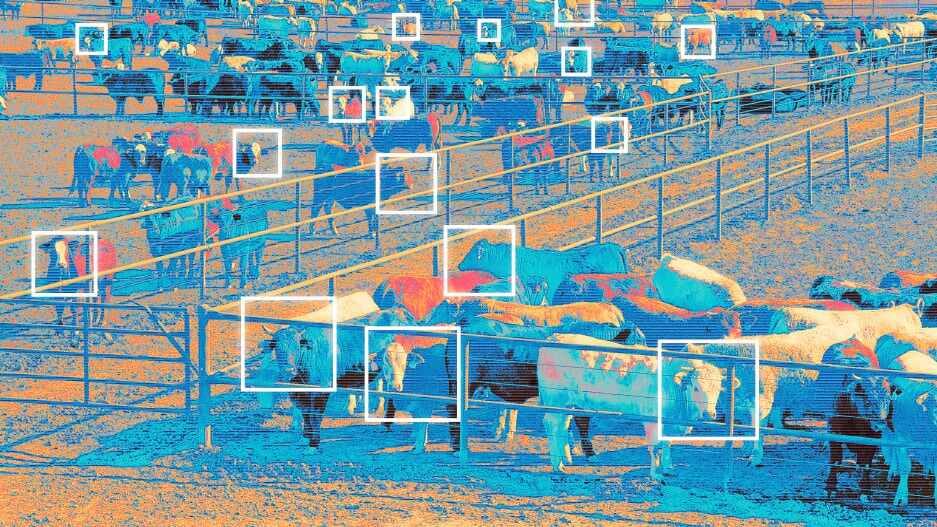- | 9:00 am
AI could fuel factory farming—or end it
Artificial intelligence is being utilized by industrial meat producers, but it could also be the key to a better future for animals.

Despite the fact that artificial intelligence is already transforming everyday life, most people don’t know much about it.
Simply put, AI is a method of making software “think” intelligently like the human mind. It can make decisions using real-time data, learning and adapting as it compiles new information. Netflix’s algorithm, for example, stores and analyzes your viewing history to predict what you may be most interested in watching next. Every time Netflix suggests a movie, it uses the data it receives based on whether or not you click play to improve the next time. Soon enough, it might know your preferences better than you do.
Discussions over the ethics of technology have been going on since long before virtually everyone had a smartphone in their pocket. Some argue that technology itself is value neutral—essentially, that a given technology is only as bad or good as the intentions of the person using it. Others argue that values are built into technologies by the people who design them.
The ethics of AI is a hot topic these days. Will it make the world better for people, or create more problems than it solves? Nobody knows for sure. But technology affects nonhuman animals as well, and we would be remiss to leave them out of our considerations.
In recent article published in the journal AI and Ethics, philosopher Peter Singer and researcher Yip Fai Tse assert that the effects of AI on nonhuman animals is a topic that has been “almost entirely neglected,” before going on to outline some of the ways AI interacts with animals both directly and indirectly. One important context they discuss at length is that of factory farming, an industry that confines billions of animals—cows, chickens, pigs, fish, etc.—in cruel conditions annually to produce cheap meat, eggs, and dairy.
In recent times, major producers of animal products like U.S.-based Tyson Foods, Thailand-based CP Foods, and Norway-based Mowi have begun to experiment with AI systems intended to make the management, slaughter, and/or processing of animals more efficient. These systems, fueled by major AI companies like Microsoft, IBM, and Alphabet, are being trialed throughout the sector to, among other activities, feed animals, monitor their growth, clip marks on their bodies, and interact with animals using sounds or electric shocks in order to control their behavior.
Some of this AI may increase animal suffering; for example, if AI can more closely monitor the health of animals, this could also enable producers to crowd even more animals into confined spaces, increasing their output while causing additional stress to the animals. But even more problematic is that it might lower the costs of animal products, thereby increasing demand for and consumption of them. (That’s because meat is an elastic good—like many products, its consumption is impacted by its price.) In other words, AI is poised to increase the number of animals who are raised and killed for food.
That’s obviously a problem. But increasingly, the footage is monitored not by a human but by AI. This was the motivation behind the AI4Animals system, developed jointly for use in the Netherlands by animal welfare organizations, a meat company (Vion), and Deloitte, a consulting firm. AI4Animals uses an algorithm to detect video segments that may contain animal welfare violations and flags them for review by humans. For example, AI4Animals detects when one or more animals stay behind while others continue, which might indicate exhaustion or an injury, as well as signs of consciousness when the animals should not be alive.
Then there are AI-backed alternative food-tech companies. Since realistic, plant-based meat analogues like Beyond Burgers and Impossible Nuggets hit the mainstream and became mildly popular with nonvegetarians over the last decade, companies with AI know-how around the world have joined the race to come up with sustainable, cruelty-free, tasty food offerings that can adequately replace traditional animal products.
Israel-based food-tech company Equinom is deploying AI to search for seeds that will grow plants with specific desired textures and nutritional values; Switzerland-based fragrance and flavoring giant Firmenich is leveraging the technology to test out flavor combinations; and the unicorn startup NotCo relies on AI to compare the molecular structure of meat or dairy products to plant sources. In the world of cell-cultured meat—meat grown from cells rather than slaughtered animals—companies like Because Animals and Animal Alternative are using AI to monitor and guide animal cell growth in an effort to replicate their products at a commercial scale.
Right now, much of this technology is still in its infancy, and pretty far from wide commercial application. But while many AI systems require significant innovation, chances are that some of them will scale up enough to become common, if not ubiquitous, in their respective industries. And for any technology to reach that point of development, it’s going to need time, talent, and, most importantly, funding. In a way, it’s a technological arms race between big ag and the many companies looking to replace or remake it for the sake of animal and environmental well-being. Programmers and investors looking to get into the food-tech industry need to first ask themselves which side they want to be on.
If technology is a reflection of a society’s values, we need to think long and hard about the innovations we invest time, money, ingenuity, and esteem into. If we consider ourselves an ethical society, it’s a moral imperative that we end factory farming. We’re at a crossroads with AI: It could be the thing that fortifies some of our ugliest, least humane practices, or it could be used to help eradicate those practices. Let’s aim for the latter—the lives of billions upon billions of animals depend on it.







































